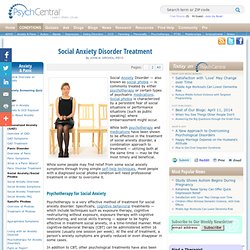

The Six Best Ways to Decrease Your Anxiety. We all know the uncomfortable feeling of anxiety. Our hearts race, our fingers sweat, and our breathing gets shallow and labored. We experience racing thoughts about a perceived threat that we think is too much to handle. That's because our "fight or flight" response has kicked in, resulting in sympathetic arousal and a narrowing of attention and focus on avoiding the threat. We seem to be locked in that state, unable to focus on our daily chores or longer-term goals . As a Cognitive-Behavior Therapist with more than 15 years of experience, I have found a variety of techniques that I can teach my patients with anxiety disorders such as phobias, panic attacks, or chronic worry.
{*style:<i><b> Techniques to achieve inner peace of mind (1) Reevaluating the probability of the threatening event actually happening </b></i>*} Anxiety makes us feel threat is imminent yet most of the time what we worry about never happens. {*style:<b><i> Soothing & healing strategies for your mind Check out my blog. Are People With Schizophrenia Living a Dream? When I lay my head down at night to go to sleep , I, like many of you, enter a fantastical dream world. In these worlds, American Idol contestants sing in tune, bright redheaded women are fighting for my affection, and every street corner is full of panhandling turtles with Viking hats singing Carmina Burana in perfect harmony.
Once I awaken, I, also like most of you, quickly lose the vividness inherent in the dreams . The turtles' chants die down, the red hairs aren't as intense, and the positive emotions I felt actually hearing good singing in a singing competition quickly fades away. Sure there are still traces in my system of these emotions and sensations, but they quickly disappear as I set out to accomplish the (mostly not nearly as interesting) tasks before me. But is this the case for everyone? The article got me thinking though about some recent research on the relation between the default network and schizophrenia . So what does the schizophrenic brain look like? References. - StumbleUpon. You bet you can. This video from Psych Central’s Daniel J. Tomasulo, Ph.D. discusses the value of taking stock of your gratitude on a daily basis with a simple gratitude exercise. It’s something that’s easy to do and improves most people’s happiness. Dr. John Grohol is the founder & CEO of Psych Central.
Social Anxiety Disorder Treatment. Social Anxiety Disorder — also known as social phobia — is commonly treated by either psychotherapy or certain types of psychiatric medications.

Social phobia is characterized by a persistent fear of social situations or performance situations (such as public speaking) where embarrassment might occur. While both psychotherapy and medications have been shown to be effective in the treatment of social anxiety disorder, a combination approach to treatment — utilizing both at the same time — may be the most timely and beneficial. While some people may find relief from some social anxiety symptoms through trying simple self-help techniques, most people with a diagnosed social phobia condition will need professional treatment in order to overcome it.
Psychotherapy for Social Anxiety Psychotherapy is a very effective method of treatment for social anxiety disorder. In addition to CBT, other psychological treatments have also been found effective in the treatment of social anxiety. Dr. Readings in Positive Psychology. Weight and Depression: 9 Must-Know Facts - iVillage. Creativity tied to mental illness - StumbleUpon. Irrelevance can make you mad By William J.

Cromie Harvard News Office Ignoring what seems irrelevant to your immediate needs may be good for your mental health but bad for creativity. Focusing on every sight, sound, and thought that enters your mind can drive a person crazy. It interferes with an animal's hunt for something to eat, or a busy person's efforts to sleep.
"Scientists have wondered for a long time why madness and creativity seem linked, particularly in artists, musicians, and writers," notes Shelley Carson, a Harvard psychologist. Carson, Jordan Peterson (now at the University of Toronto), and Daniel Higgins did experiments to find out what these conditions might be. They put 182 Harvard graduate and undergraduate students through a series of tests involving listening to repeated strings of nonsense syllables, hearing background noise, and watching yellow lights on a video screen. IQ and creativity "We didn't find this," Carson notes.